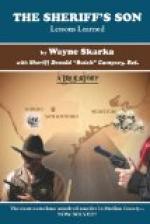To-night the thoughts of John Beaudry were somber. He looked over his past with a strange feeling that he had lived his life and come to the end of it. He was not yet forty, a well-set, bow-legged man of medium height, in perfect health, sound as to every organ. From an old war wound he had got while raiding with Morgan he limped a little. Two more recent bullet scars marked his body. But none of these interfered with his activity. He was in the virile prime of life; yet a bell rang in his heart the warning that he was soon to die. That was why he was taking his little son out of the country to safety.
He took all the precautions that one could, but he knew that in the end these would fail him. The Rutherfords would get him. Of that he had no doubt. They would probably have killed him, anyhow, but he had made his sentence sure when he had shot Anse Rutherford and wounded Eli Schaick ten days ago. That it had been done by him in self-defense made no difference.
Out of the Civil War John Beaudry had come looking only for peace. He had moved West and been flung into the wild, turbulent life of the frontier. In the Big Creek country there was no peace for strong men in the seventies. It was a time and place for rustlers and horse-thieves to flourish at the expense of honest settlers. They elected their friends to office and laughed at the law.
But the tide of civilization laps forward. A cattlemen’s association had been formed. Beaudry, active as an organizer, had been chosen its first president. With all his energy he had fought the rustlers. When the time came to make a stand the association nominated Beaudry for sheriff and elected him. He had prosecuted the thieves remorselessly in spite of threats and shots in the dark. Two of them had been put by him behind bars. Others were awaiting trial. The climax had come when he met Anse Rutherford and his companion at Battle Butte, had defeated them both single-handed, and had left one dead on the field and the other badly wounded.
Men said that John Beaudry was one of the great sheriffs of the West. Perhaps he was, but he would have to pay the price that such a reputation exacts. The Rutherford gang had sworn his death and he knew they would keep the oath.
The man sat with one hand resting on the slim body of the sleeping boy. His heart was troubled. What was to become of little Royal without either father or mother? After the manner of men who live much alone in the open he spoke his thoughts aloud.
“Son, one of these here days they’re sure a-goin’ to get yore dad. Maybe he’ll ride out of town and after a while the hawss will come galloping back with an empty saddle. A man can be mighty unpopular and die of old age, but not if he keeps bustin’ up the plans of rampageous two-gun men, not if he shoots them up when they’re full of the devil and bad whiskey. It ain’t on the cyards for me to beat them to the draw every time, let alone that they’ll see to it all the breaks are with them. No, sir. I reckon one of these days you’re goin’ to be an orphan, little son.”




